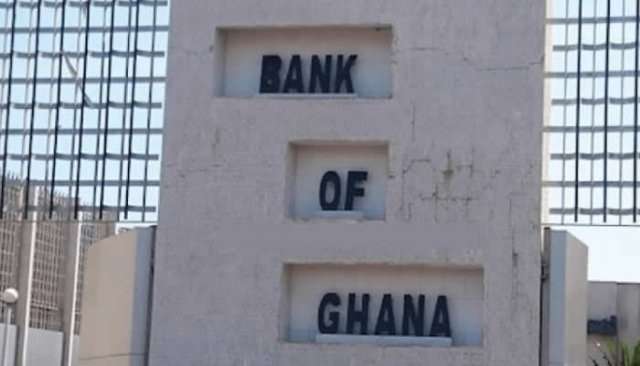
The Bank of Ghana (BoG) has responded to a comment by former President of the Volta Regional House of Chief, Togbe Afede XIV who is also an astute businessman in Ghana, to the effect that interest rate in Ghana is high.
The central bank indicated that Togbe Afede XIV is reported to have raised several issues about Bank of Ghana’s conduct of monetary policy and its governance structure.
While they rarely comments on general media discussions with the understanding that different stakeholders will have different views on the conduct of monetary policy, and also has a strong commitment not to be distracted by such discussions but rather remain focused on its primary mandate of controlling inflation, the BoG said it found it very important to respond to the claims by made by the revered traditional ruler.
A statement issued by the Research Department of the BoG said “To begin addressing the issues he raised, we will put in perspective where we have come from as far as macroeconomic management is concerned. Achieving and maintaining macroeconomic stability has been one of the major challenges to public policy making in Ghana. Its evolution is intertwined with the development history of Ghana. More recently, the current Management of the Bank of Ghana has worked very closely with other key stakeholders to achieve significant stability in the last four (4) years. Inflation which was 15.4 percent at the end of 2016 was brought down significantly to 7.9 percent in 2019, until the disinflation process was dislodged with the onset of the covid pandemic, which saw inflation rising again in 2020 and currently estimated at 12.2 percent at the end of November 2021.
“The gains from this disinflation process has been passed on to the market as the Central Bank reduced the Monetary Policy Rate, which stood at 25.5 percent at the end of 2016 to 13.5 percent at the September 2021, and lending rates have dropped from 28.1 percent at the end of 2016 to 20.2 percent at the end of September 2021. This was only raised recently by 100 basis points in November 2021 to address rising underlying inflationary pressures which was becoming embedded. In the process, we have seen growth rebound strongly in the last four years. The ultimate impact has been a relatively stable currency in the last four years, a stability that has not been observed in the last two decades.
“For the Central Bank, the above context provides the basis for understanding the conduct of monetary policy in a developing country on a disinflation path and how that can be starkly different from the conduct of monetary policy in jurisdictions where inflation is in its steady state. For a good part of our history, inflation in Ghana has been in double digits whereas in the
UK inflation is below 2 percent and even dipped to negative territories at some point.
“The conduct of monetary policy under these two settings are very different and the UK is a very poor comparator choice for Ghana. The assertion that the UK Government is more indebted than the Government of Ghana using metrics such as debt-to-GDP ratio and debt per capita and yet, the rate at which the Bank of England lends to banks is 0.1 percent, while the rate at which the Bank of Ghana lends to banks in Ghana is 13.5 percent again amplifies the point of a poor choice of comparator, and also demonstrates the oversimplification of the relationship between debt and interest rates. The headline debt-to-GDP number completely misses the fine details unless we look at other debt indicators such as the debt service costs. In fact, it is the debt service cost that determines the immediate impact of high debt on the fiscal and it’s ultimate crowding out effect.
Response-to-Issues-Raised-by-Togbe-Afede-on-High-Interest-Rates-2Download
“And in this case, let us draw the author’s attention to the difference between the UK and Ghana. While the Overall General Government Gross debt to GDP ratio is 108.5 percent in UK and 83.5 percent in Ghana, the debt service cost in UK is about 5 percent of total fiscal revenues and translates to about 2 percent of GDP. In Ghana, our debt service costs is about 79 percent of total revenue and about 10 percent of GDP. This is where the incidence on the fiscal is critical and why the Government of Ghana will have to pay a higher interest rate to borrow to service debt compared to the UK. The interest rate floor of the policy corridor are completely different for the two economies. And for that reason, the rate at which the Bank of Ghana’s Monetary Policy rate
will be effective in helping manage liquidity and achieve the price stability objective, is constrained by the debt service cost and public sector borrowing requirement dynamics on interest rates. It is therefore completely erroneous and misleading and spurious analysis to simplify the monetary policy stances comparison with just the overall debt-to-GDP comparison
of two completely different economies with different fundamentals.
It is important to bring other perspectives in context to show why the analysis in the said article can at best be generously described as spurious . It is also important to note that the UK debt is highly printable. The Pound Sterling, as we all know, is a reserve currency. This means that other sovereigns and central banks are keen on holding such assets as part of their reserves. For
this very reason, the UK Government is able to issue debt at a lower cost to support monetary policy conduct. This argument does not hold for only the Pounds Sterling but for all SDR basket of currencies like the USD, JPY, the Euro etc etc. The Ghana Cedi is not yet convertible even in the sub region and let alone considered as a reserve currency. What this means is that in order to
attract inflows Ghana will have to pay a premium, resulting in the issuance of debt at a higher cost.
Debt comparisons will also have to be done taking into consideration the components of the debt. Here are some facts. About 18.1 percent of the domestic debt stock is held by nonresidents, while the total non-resident holdings of the public debt constitutes about 57.3 percent of total public debt. As at September 2021, the foreign currency denominated debt component of the total debt stock stood at 48.7 percent. Given these facts, the profile of our public debt stock is highly sensitive to movements of the exchange rate and would require higher interest rates to maintain exchange rate stability to guarantee debt sustainability.
By Laud Nartey|3news.com|Ghana






